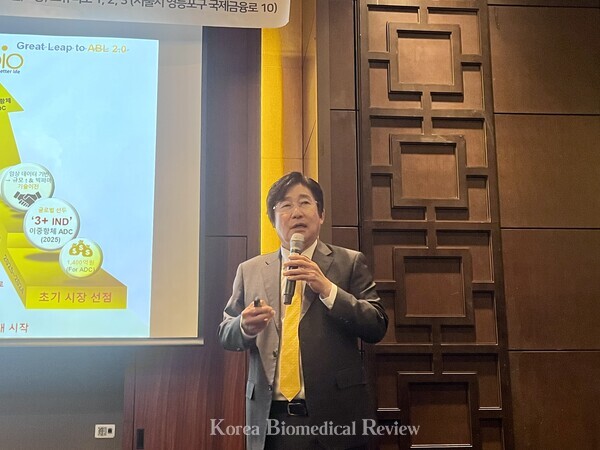For ABL Bio, the next few months could be pivotal. As the company pursues a long-promised global deal, the challenge lies in delivering results while regaining investor trust.
ABL Bio, a Korean biotech firm, is reportedly close to finalizing a landmark technology licensing agreement with a global pharmaceutical company. The deal, said to be worth over 1 trillion won ($696 million), centers on the company’s Grabody-B platform—a technology that promises to break barriers in neurological disease treatment.
At a corporate briefing on Thursday, CEO Lee Sang-hoon hinted that the agreement “might even eclipse the company’s 2022 deal with Sanofi,” valued at 1.47 trillion won. That earlier agreement, which involved ABL301, a Parkinson’s disease treatment, included 100 billion won in upfront payments.
This time, the stakes are higher, with Lee noting that the upcoming deal is expected to include “superior upfront and milestone payments.”

The potential deal under negotiation involves Grabody-B, a platform designed to improve drug delivery across the blood-brain barrier (BBB). The BBB has long posed challenges in treating neurological diseases by limiting the ability of many therapeutic molecules to reach the brain. Grabody-B employs receptor-mediated transcytosis, targeting the insulin-like growth factor 1 receptor (IGF1R) to deliver antibodies more effectively to the brain.
“The global interest in BBB-shuttle technologies has surged,” Lee said, pointing to successes like Roche and Genetech’s Alzheimer’s drug trontinemab, which employs a similar approach. “At the J.P. Morgan Healthcare Conference, pharmaceutical companies expressed confidence in Grabody-B’s readiness. They said no further validation is necessary.”
Investor frustration meets strategic ambition
While the technology shows promise, investor sentiment remains cautious after years of delays and unmet expectations.
“We hear the same thing every year,” one shareholder said during the briefing. “It’s always ‘soon’ and ‘next year.’ Last year, even after getting a term sheet, it fell apart. Another delay, another excuse. How do we know this time is different?”
In mid-2024, Lee announced that ABL Bio had received a term sheet from one pharmaceutical company, a move initially viewed as a breakthrough. However, negotiations stalled, and Lee revealed during the briefing that the company had walked away from the agreement, instead pursuing a larger deal with one of the global firms it met at J.P. Morgan.
“Entering an exclusive deal with a smaller partner would have limited our ability to negotiate bigger deals with Big Pharma,” Lee explained. “We’re now in advanced discussions with multiple companies, focusing on finalizing contract terms. There’s even potential for multiple deals if there’s no overlap in interest.”
For some shareholders, such explanations felt familiar—and unconvincing. “You hype up term sheets and then abandon them after raising funds. It feels like a betrayal,” one shareholder remarked.
Building momentum around key programs
Lee defended the company’s strategy, framing past setbacks as necessary steps in a high-stakes game. “Strategic delays are frustrating, but they’re necessary,” he said. “We’re not just chasing any deal; we’re chasing the right deal.”
He insisted that the company is negotiating from a position of strength, with Grabody-B and its broader pipeline providing reasons for optimism. ABL301, the Parkinson’s treatment licensed to Sanofi, has completed dose-escalation trials, and phase 1 topline data is expected by mid-2025. Meanwhile, phase 2/3 results for ABL001, a bispecific antibody treatment for bile duct cancer, are expected in March.
If successful, Lee said ABL001 could gain FDA approval as a second-line treatment for bile duct cancer by 2026, potentially generating royalties in the “hundreds of billions of won” after 2027. Trials at the MD Anderson Cancer Center in Texas are also underway to evaluate ABL001 as a first-line treatment, further broadening its market potential.
“If the bile duct cancer trial succeeds, royalties could finally start flowing in,” one investor acknowledged. “But until then, it’s just more waiting.”
Investors’ frustrations were palpable during the Thursday morning shareholder meeting, where stock prices dipped as skepticism about Lee’s ability to deliver resurfaced. One shareholder pointed out the cyclical nature of these meetings: “Stock prices drop after every IR session because trust has eroded.”
But by Thursday afternoon, following additional updates at a press conference, ABL Bio’s stock rebounded, closing 4.97 percent higher at 33,800 won on the Kosdaq market.
Beyond Grabody-B, ABL Bio is advancing its U.S. expansion plans through its California-based subsidiary, ABL Bio USA, established in 2022. The unit is focused on developing bispecific antibody-drug conjugates (ADCs) and preparing for clinical trial applications later this year. By 2028 or 2029, the company aims to either take the subsidiary public on Nasdaq or position it for acquisition.
“We envision ABL Bio USA as either a publicly traded entity or a highly attractive acquisition target,” Lee said. To support these goals, the company plans to hire a new CEO, reportedly a former Genentech executive, by March, along with a chief medical officer by this summer.
Related articles
- ABL Bio’s anticancer drug candidate emerges as US partner’s core pipeline
- ABL Bio gets $5 mil. milestone from Sanofi for ABL301 neurogenerative disease treatment
- ABL Bio's decision to halt immunotherapy development leaves investors seeking answers
- CStone challenges Merck’s ROR1-ADC with new candidate in DLBCL and solid tumors
- ABL Bio expands ABL103 trial, adding Keytruda and chemo in solid tumors
- ABL Bio faces pivotal moment as biliary tract cancer trial data could define its future
- Compass touts ABL Bio-partnered bispecific after pivotal trial success in biliary tract cancer
- ABL Bio spikes 30% on $2.7 bil. GSK licensing deal for BBB-shuttling brain drugs
- ABL Bio held back its top Alzheimer’s targets. GSK still signed a $2.7 bil. licensing deal.
- Compass begins testing ABL Bio-partnered tovecimig in patients with advanced bile duct cancer
- ABL Bio wins Eurasian patent for brain drug delivery antibody
- ABL Bio’s partner to unveil ABL111 combo therapy’s phase 1 results in Europe

